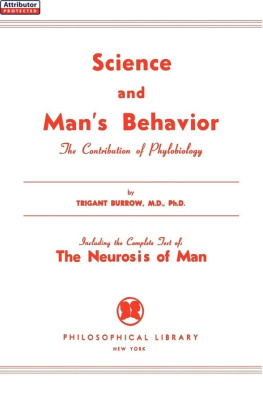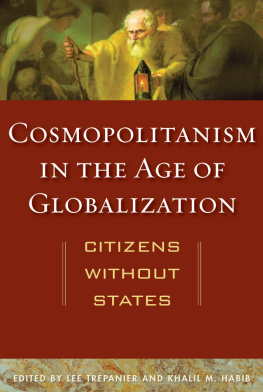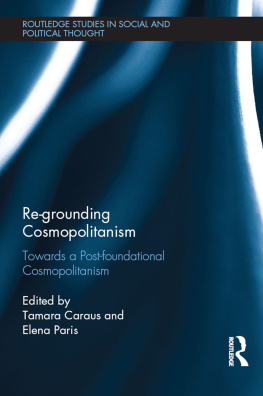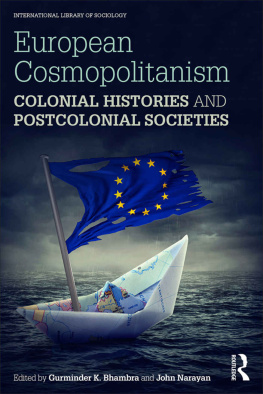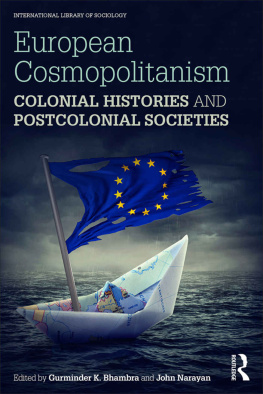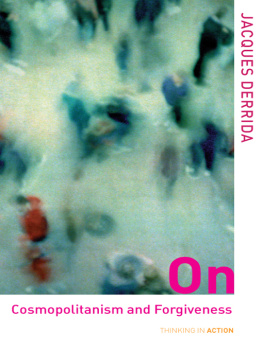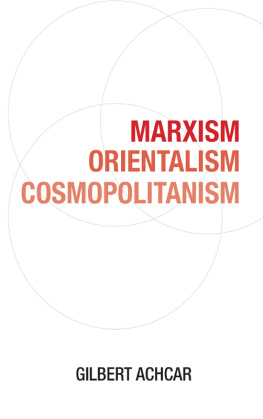
SOCIABILITY AND COSMOPOLITANISM: SOCIAL BONDS ON THE FRINGES OF THE ENLIGHTENMENT
THE ENLIGHTENMENT WORLD: POLITICAL AND INTELLECTUAL HISTORY OF THE LONG EIGHTEENTH CENTURY
Series Editor: | Michael T. Davis |
Series Co-Editors: | David Armitage |
Jack Fruchtman, Jr |
Iain McCalman |
Jon Mee |
Paul Pickering |
Advisory Editor: | Hideo Tanaka |
TITLES IN THIS SERIES
1 Harlequin Empire: Race, Ethnicity and the Drama of the Popular Enlightenment
David Worrall
2 The Cosmopolitan Ideal in the Age of Revolution and Reaction, 17761832
Michael Scrivener
3 Writing the Empire: Robert Southey and Romantic Colonialism
Carol Bolton
4 Adam Ferguson: History, Progress and Human Nature
Eugene Heath and Vincenzo Merolle (eds)
5 Charlotte Smith in British Romanticism
Jacqueline Labbe (ed.)
6 The Scottish People and the French Revolution
Bob Harris
7 The English Deists: Studies in Early Enlightenment
Wayne Hudson
8 Adam Ferguson: Philosophy, Politics and Society
Eugene Heath and Vincenzo Merolle (eds)
9 Rhyming Reason: The Poetry of Romantic-Era Psychologists
Michelle Faubert
10 Liberating Medicine, 17201835
Tristanne Connolly and Steve Clark (eds)
11 John Thelwall: Radical Romantic and Acquitted Felon
Steve Poole (ed.)
12 The Evolution of Sympathy in the Long Eighteenth Century
Jonathan Lamb
13 Enlightenment and Modernity: The English Deists and Reform
Wayne Hudson
14 William Wickham, Master Spy: The Secret War against the French Revolution
Michael Durey
15 The Edinburgh Review in the Literary Culture of Romantic Britain: Mammoth and Megalonyx
William Christie
16 Montesquieu and England: Enlightened Exchanges, 16891755
Ursula Haskins Gonthier
17 The Sublime Invention: Ballooning in Europe, 17831820
Michael R. Lynn
18 The Language of Whiggism: Liberty and Patriotism, 18021830
Kathryn Chittick
19 Romantic Localities: Europe Writes Place
Christoph Bode and Jacqueline Labbe (eds)
20 William Godwin and the Theatre
David OShaughnessy
21 The Spirit of the Union: Popular Politics in Scotland
Gordon Pentland
22 Ebenezer Hazard, Jeremy Belknap and the American Revolution
Russell M. Lawson
23 Robert and James Adam, Architects of the Age of Enlightenment
Ariyuki Kondo
FORTHCOMING TITLES
Dialogue, Didacticism and the Genres of Dispute: Literary Dialogues in the Age of Revolution
Adrian J. Wallbank
British Visions of America, 17751820: Republican Realities
Emma Vincent Macleod
SOCIABILITY AND COSMOPOLITANISM: SOCIAL BONDS ON THE FRINGES OF THE ENLIGHTENMENT
EDITED BY
Scott Breuninger and David Burrow
First published 2012 by Pickering & Chatto (Publishers) Limited
Published 2016 by Routledge
2 Park Square, Milton Park, Abingdon, Oxon OX14 4RN
711 Third Avenue, New York, NY 10017, USA
Routledge is an imprint of the Taylor & Francis Group, an informa business
Taylor & Francis 2012
Scott Breuninger and David Burrow 2012
All rights reserved, including those of translation into foreign languages. No part of this book may be reprinted or reproduced or utilised in any form or by any electronic, mechanical, or other means, now known or hereafter invented, including photocopying and recording, or in any information storage or retrieval system, without permission in writing from the publishers.
Notice:
Product or corporate names may be trademarks or registered trademarks, and are used only for identification and explanation without intent to infringe.
BRITISH LIBRARY CATALOGUING IN PUBLICATION DATA
Sociability and cosmopolitanism : social bonds on the fringes of the Enlightenment. (The Enlightenment world)
1. Enlightenment Europe. 2. Enlightenment United States. 3. Social interaction History 18th century. 4. Cosmopolitanism History 18th century. 5. Europe Civilization 18th century. 6. United States Civilization 1783-1865.
I. Series II. Breuninger, Scott. III. Burrow, David.
306.09409033dc23
ISBN-13: 978-1-84893-262-3 (hbk)
Typeset by Pickering & Chatto (Publishers) Limited
CONTENTS
Scott Breuninger would like to thank a number of people for their support and encouragement. In particular, Larry Dickey, David Burrow, David Sheffler, Sean Farrell, Jim Rogers and Michael Brown have provided excellent academic advice and insight through the years. Additionally, Scott would like to thank the College of Arts and Sciences at the University of South Dakota, as well as Truman and Berverly Schwartz, for financial support that enabled him to continue his research during this project. Most especially, Scott would like to thank his wife, Melanie, for her unstinting support during this process and his son, Hudson, for helping him keep a sense of perspective.
David Burrow wishes to thank Sean Gillen, Scott Breuninger and Andrew Hamilton for their comments on an earlier version of his chapter, and his colleagues in the History Department and the College of Arts and Sciences for their support.
For their comments on earlier drafts of his essay, Mark Nixon would like to thank Peter Otto, Colin Nettelbeck, and Deirdre Coleman. All opinions and errors remain, of course, his responsibility.
Scott Breuninger is an Associate Professor of History and Director of the Honors Program at the University of South Dakota. His publications include Recovering Bishop Berkeley: Virtue and Society in the Anglo-Irish Context (Palgrave, 2010) and articles in Religion in the Age of Enlightenment, the Journal of Religious History, New Hibernia Review and Southern Quarterly, as well as a chapter in Anglo-Irish Identities 15711845 (Bucknell University Press, 2008). His current research focuses on the Irish Enlightenment and notions of empire during the long eighteenth century.
David Burrow is an Assistant Professor of History at the University of South Dakota, where he teaches Russian, German and modern European history. His article Food at the Russian Court and the Homes of the Imperial Russian Elite, Sixteenth to Mid-Nineteenth Centuries appears in Royal Taste: Food, Power and Status at the European Courts after 1790 (Ashgate, 2011). He specializes in Russian social and intellectual history, and his current research focuses on the Russian sociable practice of the open table as a vehicle for understanding Russian noble identity and the experience of the Enlightenment.
Marianna DEzio lives and works in Italy, where she is Adjunct Professor of English at the University of Rome Sapienza and teaches International Baccalaureate Literature Programs at Marymount International College. She edited a collection of essays on eighteenth-century literature for Cambridge Scholars Publishing and is currently editing a collection of essays on Jane Austens




